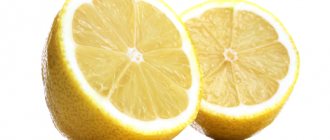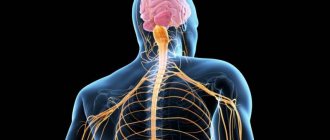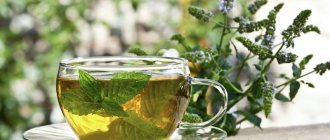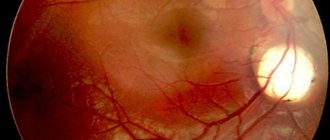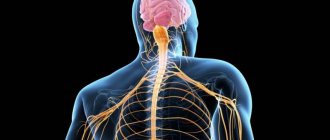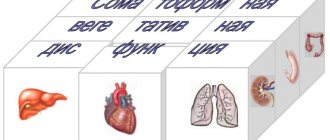Nutrition directly affects the functioning of the nervous system of both adults and children. Micronutrients are used both in the formation of new neurons and in stimulating impulse sensitivity.
Modern research indicates a significant connection between daily diet and the health of the nervous system, brain activity and mood.
From this article you will learn which vitamins and microelements are most necessary for the normal functioning of the nervous system. We will discuss which products will help improve its performance and which ones should be avoided.
Let's remember that in the last article we looked at the 20 most useful foods for the brain.
General nutrition rules
If there are any problems in the functioning of the nervous system, as well as for their prevention, nutritionists recommend adhering to the following diet rules:
- Complete abstinence from alcohol. Even ethanol-based drugs have, albeit insignificant, but still a negative effect on the functioning of the nervous system. Therefore, the first thing to do is to completely give up alcohol.
- Eat foods containing flavonoids daily. And these are, as a rule, fresh fruits and vegetables. And precisely fresh, since after heat treatment there are practically no essential oils or flavonoids left.
- Maintain the correct water-salt balance. The correct balance of potassium and sodium in the blood is important for the brain. If sodium is exceeded, then sensitivity to impulses decreases, and at the same time pressure in the vessels of the brain increases (which in certain situations can even provoke their rupture).
- Under no circumstances should you follow a diet that completely excludes sugar. Today, these are extremely popular, as they allow you to speed up the absorption of protein and quickly get rid of excess weight. But for the brain this is a powerful stress, since it can function precisely thanks to amino acids and carbohydrates.
- Be sure to use rock salt. Moreover, the recommended daily intake is almost 6 grams. Even better is to use iodized salt for cooking. It costs about the same as a regular one, but its benefits for the brain are many times greater.
And most importantly, it is necessary to maintain variety in the diet. You should not eat only fruits and vegetables, or vice versa – only seafood. In excess, both vitamins and amino acids can even harm the body, but an even worse effect on the functioning of the nervous system is an imbalance of micronutrients, which can provoke serious diseases.
Foods good for the nervous system
The food components that need to be consumed to calm and strengthen the psyche include products primarily of plant origin. They contain many useful substances and have a beneficial effect on the nervous system.
Seafood: seaweed and iodized salt
Nutrition during stress should include as many vitamins and amino acids as possible.
Seafood can be good sources of these elements:
- Chlorella. It contains a lot of calcium, phosphorus, magnesium, potassium, zinc, iodine, vegetable proteins, chlorophyll and other equally useful substances. These include B vitamins, especially B12, the deficiency of which affects the central nervous system. Therefore, it is advisable to eat chlorella as often as possible.
- Spirulina. Cyanobacteria (blue-green microalgae) contains more than 2000 components, including about 20 amino acids, nucleic acids, a complex of vitamins, biological enzymes, polysaccharides, micro- and macroelements. The plant contains 70% protein mass, large amounts of potassium, magnesium, and phosphorus. Spirulina calms the nerves and increases mental resistance to adverse external stimuli.
- Kelp. Sea kale is a widely known algae that is used in dietary and medicinal nutrition. It contains: B vitamins, as well as A, E and C, proteins, plant fiber, various amino acids, alginic acid, iron, magnesium, manganese, iodine, phosphorus. Seaweed can be consumed fresh in salads and soups, or you can add dry kelp powder to food, which does not lose the properties of the natural product.
- Wakame. These are edible algae “chuka”, which are mined in the Far East. The rich natural composition allows you to saturate the body with useful substances - the stems contain many minerals: zinc, iodine, sodium, selenium, iron, manganese, phosphorus. In addition, sea lettuce contains fiber, thiamine, natural collagen and Omega-3 fatty acids.
- Iodized salt. A product that can be bought in any store. Most doctors recommend replacing regular salt with one that has added iodine and using it for all cooking. However, its daily intake should not exceed 6 g (1 tsp).
Chocolate with carob
Food products and dishes prepared with carob are becoming increasingly popular among adherents of a healthy lifestyle. It is a sweet powder made from dried carob. They are increasingly being replaced by cocoa, with which it has a similar taste.
However, carob does not contain harmful psychotropic substances that cocoa is rich in, in particular caffeine. Chocolate, which is prepared using carob, does not cause nervous excitement; on the contrary, it produces a calming effect. To pamper your body with a small amount of sweets 1-2 times a week, it is better to choose chocolate that is made from carob.
Pomegranate
Doctors and nutritionists believe that daily consumption of pomegranate seeds and juice leads to active longevity and health. The fruits have a high content of vitamins B, A, C, E, PP, calcium, iodine, iron, magnesium, sodium, potassium, phosphorus.
Pomegranate has a good antioxidant effect, effectively reduces blood pressure and protects against cancer. If you are prone to nervous overstrain, you should drink 0.5-1 glass of pomegranate juice every day. To weaken the too sour taste, it should not be sweetened, but diluted with boiled water in a 1:1 ratio.
Nuts
All nuts are a storehouse of nutrients. They are rich in fatty acids, magnesium, copper, zinc, tryptophan, molybdenum, sulfur and potassium. They also contain lecithin, which is necessary to maintain active brain activity and nourish nerve cells.
It has been proven that nuts in their natural form can increase serotonin levels in the body, which helps improve mood and relieve symptoms of nervous tension.
It is believed that eating a small handful of nut mixture per day is enough - as a snack between meals or as part of meals.
Citrus
Oranges, tangerines, and grapefruits are the main sources of vitamin C during the cold season. Even the smell of these fruits improves your mood, eliminates anxiety, and sets you up for a positive way of thinking.
It is believed that regular consumption of these fruits helps in the treatment of depressive and hysterical conditions. Therefore, doctors recommend eating 1-2 citrus fruits daily, especially in the morning - this will give a boost of vigor and optimism for the whole day.
Recent studies have shown that it is better to consume citrus fruits whole rather than squeeze the juice from them, as this will deprive them of fiber that is beneficial to the body. However, drinking juice guarantees rapid absorption of all substances by the body, which means the effect of an optimistic mood will come faster.
Beans and other legumes
Legumes - beans, peas, lentils - have long served as complete sources of vegetable protein, which are in no way inferior to proteins obtained from meat. This is actively used by vegetarians and vegans.
In addition, these foods are high in fiber, which aids digestion. Beans have a rich chemical composition: vitamins A, group B, C, calcium, iron, magnesium, phosphorus, potassium and zinc are almost completely represented.
Eating legumes 2-3 times a week in soups, salads or as a side dish can reduce anxiety, improve sleep and improve mood.
Bananas
These tasty and nutritious fruits are recognized protectors against stress. When consumed, the body receives a sufficient amount of folic acid, magnesium, potassium, vitamins K, A and C, which allows the brain and nerves to more actively cope with stressful situations.
In addition, the pulp of the fruit contains serotonin - the hormone of happiness. Doctors recommend eating 1-2 ripe bananas for breakfast every day to fill your body with energy for the coming day.
However, bananas have a high glycemic index, which is something to keep in mind for those with high blood sugar or diabetes.
Whole grains
Whole grain products are rich in essential folic acid, which effectively fights depression and depression. Also, food made from whole grains speeds up metabolism and helps lower blood sugar levels and remove “bad” cholesterol.
You don't have to cook it! Oats can be added to muesli, poured with juice and consumed without cooking. Green buckwheat can be soaked overnight, and in the morning you can make raw porridge in a blender or without it, adding bananas and finches.
It is recommended to include various porridges in your daily diet, especially oatmeal, buckwheat, and pearl barley.
Herbal teas
To strengthen the nervous system, it is useful to drink herbal teas. They have a mild sedative effect, help improve sleep, relieve spasms and headaches, and reduce anxiety.
To calm down, you can drink teas daily from: chamomile, mint, lemon balm, St. John's wort, fireweed, linden flowers, wormwood, rose hips, valerian. They can be brewed either separately or in herbal mixtures.
Before using herbal remedies, it is recommended to consult a doctor, since some herbs may have contraindications for use.
Plain water
Plain water is vital for the health of every person, and weak-hearted people are advised to always keep a bottle of liquid with them. In a critical situation, even a few sips will help you quickly come to your senses.
To ensure the normal functioning of the body, you need to drink at least 2-2.5 liters of purified still water daily. The daily norm is calculated using the formula: 30 ml per 1 kg of body weight.
This amount does not include teas, juices, soups and other liquid dishes.
Amino acids
With constant nervous tension, the body requires amino acids, which improve brain function, are involved in the production of proteins and are neurotransmitters.
The amino acids necessary for humans include: glycine, glutamic acid, tryptophan, tyrosine, phenylalanine, methionine. They help improve metabolic processes, increase emotional mood, and normalize sleep.
To cope with stress, the body needs to actively produce the hormone serotonin, which causes a feeling of calm. The amino acid L-tryptophan is required for the synthesis of serotonin. It has a beneficial effect on sleep and reduces the need for stress eating.
Amino acids are found in: seafood, nuts, vegetables and fruits, unrefined oils.
What should you limit?
The most harmful foods for the nervous system are:
- Alcohol. They literally destroy nerve cells and prevent their regeneration. It’s worth giving them up first.
- Coffee. Although it contains caffeine, if abused it destabilizes the normal functioning of the brain. You don’t have to completely give up this drink, but you should still minimize its consumption. Read more about the effects of coffee here.
- Dyes. In particular, tartarazine, which is most often added to desserts (has a red tint). Significantly inhibits the release of endorphins, so it can provoke depression or chronic nervousness.
- Monosodium glutamate. In fact, this is the most common flavoring additive, found most often in chips, salty crackers, some sweets, and also in sausages. It also inhibits the release of endorphins.
Meat, fish and poultry
They contain proteins, and this is the building material for all cells of the body, including nerve endings that are damaged during stress.
If you love fish, then your body will receive healthy omega-3 fatty acids in addition to proteins. They contribute not only to the health of the nervous system, but also reduce the level of harmful cholesterol in the blood, which means they support the heart, which suffers especially greatly from nervous tension.
Advice. Choose lean varieties of meat, but you can eat any fish, including fatty ones.
Burdock or food? How much can you trust the lists of harmful products Read more
In what cases does the diet need to be adjusted?
Doctors identify several symptoms that require you to reconsider your diet. First of all, you should pay attention to the following signs:
- chronic insomnia;
- frequent migraine attacks;
- it is difficult for a person to concentrate;
- noticeable memory impairment;
- deteriorated sensitivity of receptors is noticeable (most often attention is paid to auditory and visual).
Attention! If you experience any of these symptoms, you should first consult a doctor to rule out serious illnesses. And then you can start making adjustments to your diet and lifestyle.
Features of the diet for women and children
Doctors say that the female body needs B vitamins more, as well as glucose . Moreover, the need for them increases during pregnancy.
Another nuance is that women have a higher risk of developing water-salt imbalance, so they should drink more water every day.
As for children, they have the greatest need for iodine, as well as vitamin C. Accordingly, it is recommended to prepare all dishes for them with iodized salt, and also add citrus fruits and fresh fruits to the diet. Even a child should definitely eat seafood, especially in preschool age. It is during this period that the brain develops most actively and metabolic processes in it should be stimulated.
Porridge
Cereals are the main source of B vitamins. These vitamins are required to support the nervous system during periods of stress. It has been proven that with strong emotional stress, the need for B vitamins increases five times!
Advice. Don’t try to save time and cook “quick” porridge from a bag. The fact is that the speed of cooking is achieved by pre-processing cereals with steam, which leads to the loss of vitamins and microelements. Therefore, porridges that are simply brewed with boiling water will not help strengthen your nerves during times of stress. Only whole grains that are cooked for quite a long time are suitable for this purpose.
Poison in a plate. What cereals can be dangerous? More details
